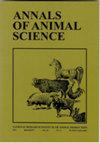Influence of dietary chitosan supplementation on growth indicators, nutrient digestibility, immunity, cecal microbiota, and intestinal morphology of growing male rabbits
IF 2.2
4区 农林科学
Q2 AGRICULTURE, DAIRY & ANIMAL SCIENCE
引用次数: 0
Abstract
Abstract The present study aimed to assess the influence of dietary chitosan on production performance, nutrient digestibility, slaughter traits, immune function, cecal microbiota, and intestinal histomorphometry of growing rabbits for 56 days. In total, sixty New Zealand White male rabbits aged 35 days (574±7.26 g, mean ± SEM) were arbitrarily assigned to four dietary groups. The experimental diets were fortified with chitosan powder at 0, 250, 500, and 1000 mg per kg diet, respectively. It was found that final weight, specific growth rate, daily weight gain, and feed: gain enhanced linearly (P<0.05) with increasing chitosan levels in the diet. No significant differences were found for all slaughter traits, including hot carcass weight, carcass yield, and internal organ weights, besides carcass parts, including head, fore, intermediate and hind parts. Hematocrit percentage (linear, P = 0.024), serum lysozyme activity (linear, P = 0.004), immunoglobulin M, and complement C3 concentrations (linearly, P<0.001) increased with increasing chitosan supplementation levels. The organic matter (P = 0.009), dry matter (P = 0.008), and nitrogen-free extract (P = 0.012) digestibilities were enhanced quadratically by dietary supplementation with chitosan. Cecal lactobacilli, E. coli, coliform and Salmonella spp. populations (linear, P<0.05) decreased in response to chitosan supplementation. All the dietary chitosan levels increased villus width, villus length, and crypt depth (linear, P<0.001), whereas muscular layer thickness decreased (linear, P=0.002). In summary, supplementing the diet of growing rabbits with chitosan can improve growth indicators, immunity, nutrient digestibility, and intestinal morphology, as well as reduce pathogenic cecal bacteria.饲粮添加壳聚糖对生长公兔生长指标、营养物质消化率、免疫力、盲肠菌群和肠道形态的影响
摘要本研究旨在评估日粮壳聚糖对生长兔56天的生产性能、营养物质消化率、屠宰特性、免疫功能、盲肠微生物群和肠道组织形态计量学的影响。总共,60只35天大的新西兰雄性兔子(574±7.26 g,平均值±SEM)被任意分配到四个饮食组。实验日粮分别添加0、250、500和1000mg/kg的壳聚糖粉。研究发现,随着日粮中壳聚糖水平的增加,最终体重、比生长率、日增重和饲料增重呈线性增加(P<0.05)。所有屠宰性状,包括热胴体重量、胴体产量和内脏重量,除了胴体部位,包括头部、前部、中间和后部,都没有发现显著差异。红细胞压积百分比(线性,P=0.024)、血清溶菌酶活性(线性,P=0.004)、免疫球蛋白M和补体C3浓度(线性,P<0.001)随着壳聚糖补充水平的增加而增加。通过添加壳聚糖,有机物(P=0.009)、干物质(P=0.008)和无氮提取物(P=0.012)的消化能力得到了二次提高。添加壳聚糖后,盲肠乳酸杆菌、大肠杆菌、大肠菌群和沙门氏菌群(线性,P<0.05)减少。所有日粮中的壳聚糖水平都增加了绒毛宽度、绒毛长度和隐窝深度(线性,P<0.001),而肌肉层厚度降低(线性,P=0.002)。总之,在生长兔的日粮中补充壳聚糖可以提高生长指标、免疫力、营养物质消化率和肠道形态,并减少盲肠病原菌。
本文章由计算机程序翻译,如有差异,请以英文原文为准。
求助全文
约1分钟内获得全文
求助全文
来源期刊

Annals of Animal Science
农林科学-奶制品与动物科学
CiteScore
4.00
自引率
5.30%
发文量
138
审稿时长
6-12 weeks
期刊介绍:
Annals of Animal Science accepts original papers and reviews from the different topics of animal science: genetic and farm animal breeding, the biology, physiology and reproduction of animals, animal nutrition and feedstuffs, environment, hygiene and animal production technology, quality of animal origin products, economics and the organization of animal production.
 求助内容:
求助内容: 应助结果提醒方式:
应助结果提醒方式:


